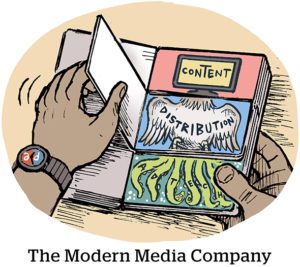 If you’ve heard enough about publishers launching their own first-party media platforms … stop reading. And maybe take a vacation for the next year or two.
If you’ve heard enough about publishers launching their own first-party media platforms … stop reading. And maybe take a vacation for the next year or two.
Warner Music Group (WMG) is the latest to throw its hat in the ring, with the launch on Thursday of a rebranded agency and ad tech business geared specifically to musicians and brands trying to reach their fans.
The new business is named WMX (not to be confused with the one-time Walmart Exchange ad platform, which went by the same moniker).
On one side WMX has a revenue toolkit for musicians and its music industry and lifestyle outlets, such as Uproxx, HipHopDX and concert discovery service Songkick.
For artists, this includes merchandise and sponsored content, as well as newer services for mobile game installations or NFTs, said WMX Chief Strategy Officer Paul Josephsen. Games are a growing channel. WMG staged a big record launch on Roblox’s platform last year and saw enough of a benefit to invest tens of millions in Roblox earlier this year.
The other side of WMX is a direct ad sales business that packages inventory and data from across WMG’s owned-and-operated sites and other platforms where artists create inventory and WMX is able to establish ad sales and rev-share agreements, including with YouTube, Spotify and TikTok.
“This is an umbrella over our individual publishers, and a central organization to combine that with our other pieces, like our significant YouTube inventory,” Josephsen said.
At the center of the new WMX service is a product called CONNEX, where marketers can develop a first-party asset within the Warner platform. If a brand shows up with its own first-party customer data, some customers will match to WMG’s identity data set, and the matched IDs can be used for targeting or measuring a campaign. If a brand campaign includes sponsored content on YouTube, WMX may also collect new fans or logged-in users who’ve engaged with the brand via that sponsorship.
But there is a catch: CONNEX data can’t leave the WMX platform, Josephsen said, which means brands can’t build audiences on Warner Music first-party and then export those audiences to target elsewhere. But the CONNEX data does build in size and effectiveness over time and helps inform creative and overall strategy, he said. A brand, for example, might see that a particular genre of music or demographic group is responding well to a campaign and focus more there.
It is now common for major media and ad platforms to have first-party data and analytics products that apply exclusively to owned-and-operated media or inventory they control. Google’s Ads Data Hub is a big one, but publishers like The New York Times, NBCUniversal and even retailers like Walmart or Target are following the same trail.
Right now, WMX only includes Warner Music’s own sites and inventory, but Josephsen said in the future the company plans to introduce an audience extension product that will allow brands to target known or logged-in audiences programmatically across the web.
Brands are pressing their supply-side partners to provide more data and stronger analytics, Josephsen said. But considering tightened privacy rules from tech companies and governments, such granular data can only be used by big media companies that have their own audiences.
“Brands are looking for fewer bigger and better partners,” he said. “We’re able to go into that level of specificity with them and do it at scale.”













